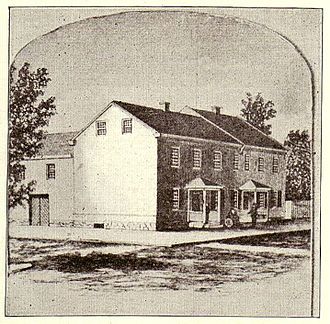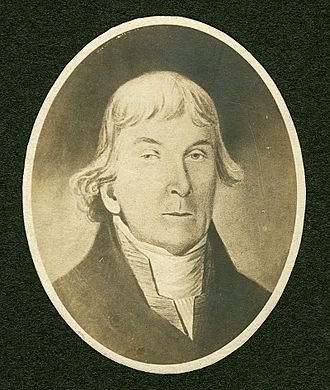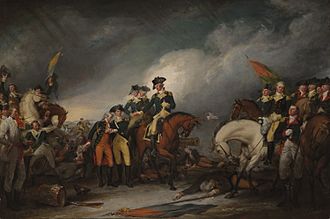Abraham Hunt facts for kids
Abraham Hunt (1741–1821) was an important merchant and farmer in Trenton, New Jersey. He was the very first Postmaster of Trenton. During the American Revolutionary War, he served as a Lieutenant Colonel in the local militia. He was also a leading member of the First Presbyterian Church in Trenton. Early in the war, he was part of the Provincial Congress. He famously hosted the German Hessian commander Johann Rall before the Battle of Trenton. Even though some people questioned his loyalty because he was friendly with the Hessians, Hunt was cleared of any wrongdoing. He then continued to serve the American cause for independence. After the war, Hunt became very active in the politics and business of Trenton and New Jersey.
Contents
Abraham Hunt's Early Life
Abraham Hunt was born on February 16, 1741. He grew up on his family's farm in Hopewell Township, New Jersey. He was the second oldest of five children born to Wilson and Susannah Price Hunt.
On February 21, 1764, Abraham married Theodosia Pearson in Hopewell. They had four children together: Pearson, Wilson, John W., and Theodore. After Theodosia passed away in 1784, Hunt married Mary Dagworthy. Mary was the sister of General John Dagworthy and taught school in Trenton.
After the French and Indian War ended in 1763, Hunt became a very successful merchant. In 1764, at just 21 years old, he started a business with Moore Furman called Furman and Hunt. Their company quickly grew and became very important for river trade between Trenton and Philadelphia. Hunt became a wealthy landowner and a main merchant in Trenton. He ran a successful shop from his home. In 1770, Hunt helped improve navigation on the Delaware River. As tensions grew with Britain, Hunt also took part in some of the early protests.
Starting in 1769, Hunt served on the Board of Trustees for the First Presbyterian Church in Trenton. The original church was built in 1712. When a new church was constructed, Hunt was one of the biggest donors for the land and building. The first stone for the new church was laid on April 15, 1805.
On January 10, 1764, Benjamin Franklin, who was the Postmaster General for the colonies, appointed Hunt as Trenton's Postmaster. In 1770, Hunt became a barrack master. In 1774, he joined the New Jersey Committee of Correspondence. Franklin appointed Hunt as Trenton's Postmaster again in 1775.
Abraham Hunt and the American Revolution

Abraham Hunt was an active member of the Provincial Congress. He attended sessions held in Trenton in May, August, and October of 1775, and again in July 1776. Hunt was also part of a group from Hunterdon County and Trenton that helped lead early protests. He served on the first General Committee of Correspondence, which was formed on July 21, 1774.
On July 8, 1774, a meeting of Hunterdon County residents took place. At this meeting, Hunt and others were chosen for a committee. Their goal was to work with other counties to select representatives for Congress.
By the time the American Revolutionary War began, Hunt was already known as a supporter of the American cause. He served on the local Committee of Correspondence. He was also a Lieutenant Colonel in Colonel Isaac Smith’s First Regiment, Hunterdon County Militia. Records show that Hunt was a very good officer when he was on active duty.
In 1776, after the Declaration of Independence was announced, Hunt was appointed as a commissioner for Hunterdon County. His job was to manage money for buying supplies, firearms, and paying the militia. He also did this work in July 1777. Historians believe that being trusted with such important duties shows Hunt's loyalty to the Patriots.
In mid-December 1776, Hessian commander Johann Rall and his soldiers marched into Trenton and took control of the town. On Christmas evening, Rall attended a party at Hunt's home in Trenton. Hunt made sure Rall and his officers had plenty of food and drinks late into the night. Hunt was known for being friendly and welcoming to both Patriots and the British. He had a beautiful home with a cellar full of fine wines, liquors, and strong beers that the Germans liked. He also had good tobacco. Hunt made all these things available, which made him popular with the Hessian officers. Historians are not sure if Hunt was loyal to the Patriots or the British at first. Some think his friendly attitude was a way to protect his property from being taken by the Hessians, while still staying on good terms with the Americans. His property was never seized by either side.
The Battle of Trenton
The Battle of Trenton was a small but very important battle during the American Revolutionary War. It happened on the morning of December 26, 1776, in Trenton, New Jersey. Before Christmas, the Hessians had been bothered by many small attacks and false alarms. This meant they had not gotten much sleep for two weeks. On Christmas night, a heavy snowfall made Hessian commander Colonel Johann Rall think that no major American attack would happen.
Rall and some of his top officers went to Abraham Hunt's house for a Christmas celebration. Hunt provided lots of food and drinks. Some accounts suggest this party made it harder for the Hessians to be ready for battle quickly.
Late that evening, a farmer who supported the British came to Hunt's house. He wanted to see Colonel Rall, who was still celebrating and playing cards. One of Hunt's servants told the farmer that Rall was too busy. The farmer then wrote a note saying that American troops were getting ready to cross the Delaware River. He asked for the note to be given directly to Rall. The farmer left, feeling he had done his part. When Rall got the note, he put it in his pocket without reading it. He then went back to his party.
Early the next morning, under the cover of darkness and heavy snow, General George Washington and General Henry Knox crossed the icy Delaware River. They brought troops, horses, and cannons. They organized their forces and began marching toward Trenton. Commander Rall and his Hessian soldiers were still at Hunt's home. While Rall and others were celebrating, Washington and his troops launched a surprise attack from two directions. After a tough fight, the Hessians were defeated. Many were captured and taken prisoner. During the battle, Rall was shot twice and was badly wounded. Before he died that evening, Rall formally surrendered to Washington.
After the battle, Washington's forces did not take Hunt's house or property. This showed that they did not consider Hunt a loyalist. However, because he had been so welcoming to the British and Hessians, Hunt faced accusations of not being loyal. But at his trial, he was completely cleared by a group of well-known Patriots. There was only one witness who could say Hunt was speaking in a way that seemed disloyal to the Hessians. Hunt continued to help the American cause. His trial was even reported on the front page of the Pennsylvania Gazette newspaper on April 22, 1777.
After the War
After America became independent, Abraham Hunt became a founding member of Trenton's Board of Aldermen in 1792. This was when Trenton officially became a city. He was also one of the men chosen to be a city legislator that year. In 1805, he helped start and became a director of the Trenton Banking Company. Under the new American government, Hunt continued to serve as the Postmaster of Trenton for many years.
On July 20, 1789, George Washington wrote a letter to Hunt. Washington was looking to buy horses and asked Hunt if he had any. He wanted horses that were at least 15 hands tall and less than six years old.
On November 13, 1792, Trenton officially became a city. The New Jersey legislature appointed Hunt and several others as city officers. They held their first meeting on December 21, 1792.
Abraham Hunt's Final Years
Abraham Hunt passed away on October 27, 1821, at the age of 81. He was buried in the cemetery of the First Presbyterian Church in Trenton. After his death, his grandson, Wesley P. Hunt, took over his businesses. In his will, Abraham Hunt left money to both the Presbyterian Church and the Episcopal Church.
|
See Also
 | William Lucy |
 | Charles Hayes |
 | Cleveland Robinson |



